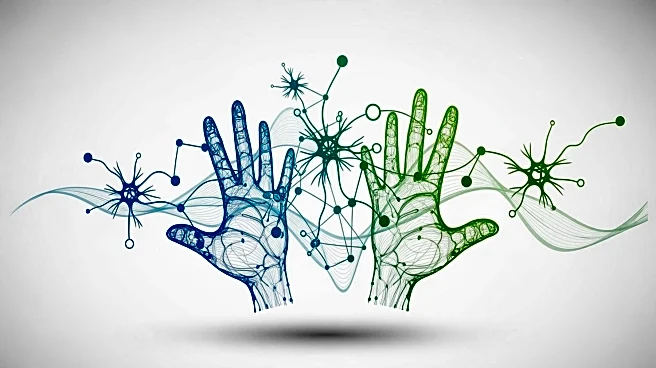What's Happening?
A recent study published in Nature introduces a self-supervised learning framework using 3D convolutional networks for Saudi Arabic Sign Language (SArSL) recognition. The research utilizes the KARSL-502
dataset, comprising 15,400 labeled gesture videos across 502 unique SArSL classes. The study employs a contrastive VideoMoCo framework, leveraging a momentum-based mechanism to update the key encoder, enhancing representation quality without relying on annotations. The model backbone is a ResNet-50 pre-trained on ImageNet, and the study explores various data augmentation strategies to improve model performance. The research highlights the importance of capturing longer temporal dynamics in sign gestures and leveraging larger batch updates for stable contrastive learning.
Why It's Important?
The development of AI frameworks for sign language recognition is crucial for improving communication accessibility for the deaf and hard-of-hearing communities. By enhancing the accuracy and efficiency of gesture recognition, this study contributes to the broader field of assistive technology, potentially leading to more inclusive communication tools. The use of self-supervised learning and data augmentation strategies could pave the way for more robust AI models capable of handling real-world variability, thus improving the reliability of sign language recognition systems. This advancement may also stimulate further research and development in AI-driven language recognition technologies.
What's Next?
Future research may focus on integrating adversarial augmentations to simulate challenging real-world distortions more effectively and exploring test-time training methods that enable the model to adapt dynamically during inference. These strategies could further enhance robustness for deployment in unpredictable environments. Additionally, the study suggests potential improvements through heuristic and metaheuristic strategies for hyperparameter optimization, which may offer additional enhancements in future studies.
Beyond the Headlines
The study's findings underscore the ethical importance of developing AI technologies that prioritize inclusivity and accessibility. By focusing on sign language recognition, researchers are addressing a critical need for communication tools that support marginalized communities. The use of AI in this context also raises questions about data privacy and the ethical use of machine learning models, emphasizing the need for transparent and responsible AI development practices.











